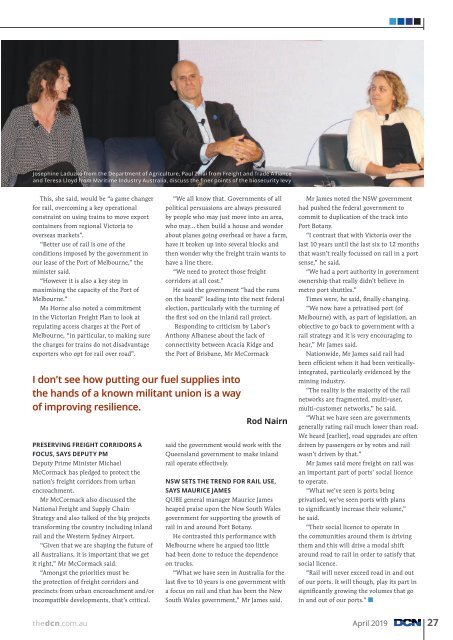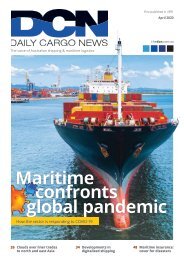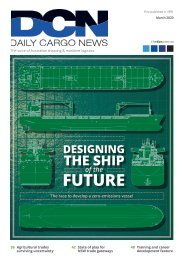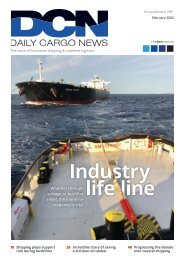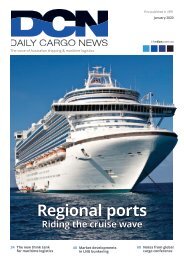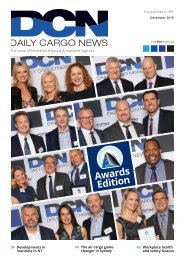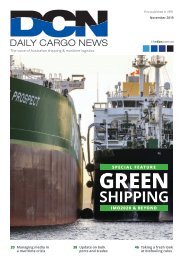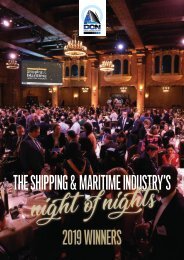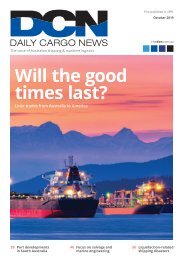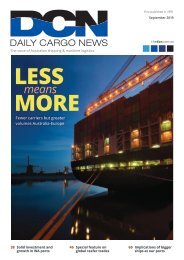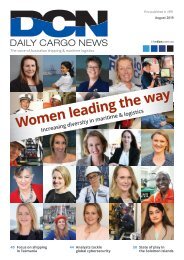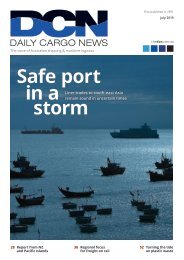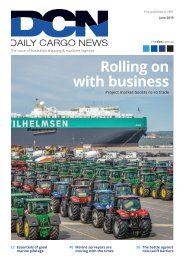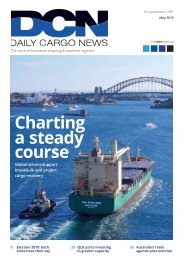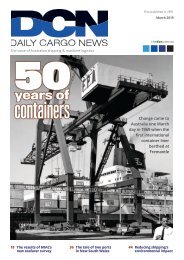DCN April 2019 Edition
Create successful ePaper yourself
Turn your PDF publications into a flip-book with our unique Google optimized e-Paper software.
Josephine Laduzko from the Department of Agriculture, Paul Zalai from Freight and Trade Alliance<br />
and Teresa Lloyd from Maritime Industry Australia, discuss the finer points of the biosecurity levy<br />
This, she said, would be “a game changer<br />
for rail, overcoming a key operational<br />
constraint on using trains to move export<br />
containers from regional Victoria to<br />
overseas markets”.<br />
“Better use of rail is one of the<br />
conditions imposed by the government in<br />
our lease of the Port of Melbourne,” the<br />
minister said.<br />
“However it is also a key step in<br />
maximising the capacity of the Port of<br />
Melbourne.”<br />
Ms Horne also noted a commitment<br />
in the Victorian Freight Plan to look at<br />
regulating access charges at the Port of<br />
Melbourne, “in particular, to making sure<br />
the charges for trains do not disadvantage<br />
exporters who opt for rail over road”.<br />
PRESERVING FREIGHT CORRIDORS A<br />
FOCUS, SAYS DEPUTY PM<br />
Deputy Prime Minister Michael<br />
McCormack has pledged to protect the<br />
nation’s freight corridors from urban<br />
encroachment.<br />
Mr McCormack also discussed the<br />
National Freight and Supply Chain<br />
Strategy and also talked of the big projects<br />
transforming the country including inland<br />
rail and the Western Sydney Airport.<br />
“Given that we are shaping the future of<br />
all Australians, it is important that we get<br />
it right,” Mr McCormack said.<br />
“Amongst the priorities must be<br />
the protection of freight corridors and<br />
precincts from urban encroachment and/or<br />
incompatible developments, that’s critical.<br />
“We all know that. Governments of all<br />
political persuasions are always pressured<br />
by people who may just move into an area,<br />
who may… then build a house and wonder<br />
about planes going overhead or have a farm,<br />
have it broken up into several blocks and<br />
then wonder why the freight train wants to<br />
have a line there.<br />
“We need to protect those freight<br />
corridors at all cost.”<br />
He said the government “had the runs<br />
on the board” leading into the next federal<br />
election, particularly with the turning of<br />
the first sod on the inland rail project.<br />
Responding to criticism by Labor’s<br />
Anthony Albanese about the lack of<br />
connectivity between Acacia Ridge and<br />
the Port of Brisbane, Mr McCormack<br />
I don’t see how putting our fuel supplies into<br />
the hands of a known militant union is a way<br />
of improving resilience.<br />
Rod Nairn<br />
said the government would work with the<br />
Queensland government to make inland<br />
rail operate effectively.<br />
NSW SETS THE TREND FOR RAIL USE,<br />
SAYS MAURICE JAMES<br />
QUBE general manager Maurice James<br />
heaped praise upon the New South Wales<br />
government for supporting the growth of<br />
rail in and around Port Botany.<br />
He contrasted this performance with<br />
Melbourne where he argued too little<br />
had been done to reduce the dependence<br />
on trucks.<br />
“What we have seen in Australia for the<br />
last five to 10 years is one government with<br />
a focus on rail and that has been the New<br />
South Wales government,” Mr James said.<br />
Mr James noted the NSW government<br />
had pushed the federal government to<br />
commit to duplication of the track into<br />
Port Botany.<br />
“I contrast that with Victoria over the<br />
last 10 years until the last six to 12 months<br />
that wasn’t really focussed on rail in a port<br />
sense,” he said.<br />
“We had a port authority in government<br />
ownership that really didn’t believe in<br />
metro port shuttles.”<br />
Times were, he said, finally changing.<br />
“We now have a privatised port (of<br />
Melbourne) with, as part of legislation, an<br />
objective to go back to government with a<br />
rail strategy and it is very encouraging to<br />
hear,” Mr James said.<br />
Nationwide, Mr James said rail had<br />
been efficient when it had been verticallyintegrated,<br />
particularly evidenced by the<br />
mining industry.<br />
“The reality is the majority of the rail<br />
networks are fragmented, multi-user,<br />
multi-customer networks,” he said.<br />
“What we have seen are governments<br />
generally rating rail much lower than road.<br />
We heard [earlier], road upgrades are often<br />
driven by passengers or by votes and rail<br />
wasn’t driven by that.”<br />
Mr James said more freight on rail was<br />
an important part of ports’ social licence<br />
to operate.<br />
“What we’ve seen is ports being<br />
privatised, we’ve seen ports with plans<br />
to significantly increase their volume,”<br />
he said.<br />
“Their social licence to operate in<br />
the communities around them is driving<br />
them and this will drive a modal shift<br />
around road to rail in order to satisfy that<br />
social licence.<br />
“Rail will never exceed road in and out<br />
of our ports. It will though, play its part in<br />
significantly growing the volumes that go<br />
in and out of our ports.”<br />
thedcn.com.au <strong>April</strong> <strong>2019</strong> 27


